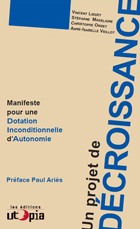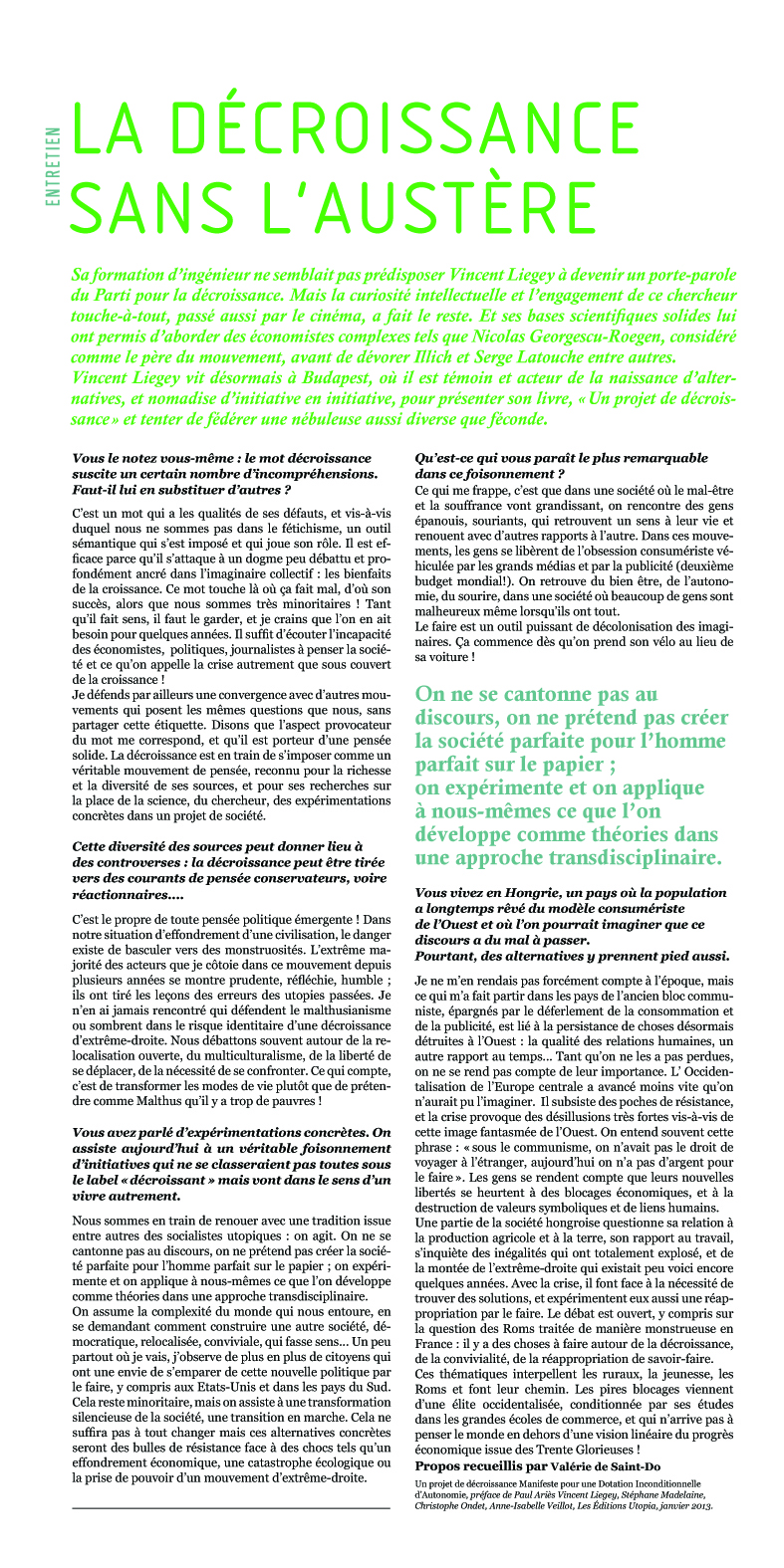Seemingly, his engineering background did not predispose Vincent Liegey to become the spokesperson for the French Degrowth Party (PPLD). But his intellectual curiosity and the commitment of this multi-skilled researcher; including a stint in cinema, has led him to it. His solid scientific knowledge has allowed him to grasp complex economists such as Nicholas Georgescu-Roegen considered the father of the movement, before he devoured Ivan Illich and Serge Latouche, among others.
Nowadays Vincent Liegey lives in Budapest where he is a witness and an actor in the birth of initiatives and he is on the road to present his book: A Degrowth Project: Manifesto for an Unconditional Autonomy Allowance, attempting to federate this fecund and diverse sphere.
As you have noted yourself, the term Degrowth is the object of some misunderstandings? Are there any substitutes?
This term has its qualities and faults and we do not revere it, it is a semantic tool that has imposed itself and plays its part. It is effective because it tackles a rarely debated issue that is deeply embedded in the collective imaginary: the benefits of growth. This term hits where it hurts, hence its success, even if we are a small minority! As long as it resonates we must keep it and I am afraid that we might need it for many years to come. We only need to listen to the inability of economists, politicians and journalists to conceive society and the so-called “crises” other than as Growth!
I also support a convergence with other movements that are asking the same questions without falling under the same umbrella label. Lets’ say the provocative aspect of the word is in tune with me and that it underpins a solid thinking. Degrowth has started to impose itself as a real current of thought, recognised for its richness, diversity of sources, and its research in the fields of science, research and practical alternatives in a societal project.
This diversity of sources can lead to controversies: Degrowth can be endorsed by conservative circles, reactionary even…
This happens with all emerging political thinking! Faced with the collapse of our society, the pitfalls of monstrosities are always looming. The greatest majority of actors I came across in this movement over the last few years is prudent, reflexive and humble: they are learning the lessons from past utopian mistakes. I never met people defending Malthusianism or falling into identity crisis of the Far Right’s Degrowth. Our debates revolve around open re-localisation, multiculturalism, freedom of movement and the need to argue our differences. What matters is to transform our lives rather than to pretend as Malthus did, that there are too many poor people!
You talk about practical alternatives. Nowadays there is a plethora of initiatives that would not fall under the umbrella of “Degrowth” but tend towards different lifestyles…
We have started to renew a long tradition stemming from the socialist utopians among others: we act. It is not limited to discourse, we do not pretend creating a perfect society for the perfect man on paper; we are experimenting and implementing the theories we develop within a transdisciplinary framework. We take into consideration the complexity of the world around us and we ask ourselves how we can build another society: democratic, re-localised, convivial, meaningful… In most places I visit I observe that more and more citizens want to endorse these new politics, as far as the USA and the Global South countries. We are still a minority, but society is undergoing a silent transformation, a transition is underway.
These practical alternatives won’t change it all by themselves but they will be spheres of resistance in case of economic collapse, environmental catastrophe or a power takeover by a Far Right group.
What is the most standout example among this plethora?
What stands out most to me is that in a society where misery and suffering is on the increase, I meet thriving, smiling people who find a meaning to their live and re-engage differently with the others. Within these groups, people free themselves from their obsession with consumption conveyed by the media and advertising (advertising is the second biggest budget on the planet). There is some wellbeing, autonomy and happiness in a society where many people are unhappy even if they have it all.
Doing is a powerful tool to decolonise our imaginaries. It starts the moment weride a bike instead of driving a car!
You live in Hungary, a country where people have been dreaming of the Western consumerist model and it is easy to imagine how it could be hard for this discourse to get traction. But alternatives are also taking place there ….
At the time I did not realise it, but what attracted me towards the old communist countries; spared by the onslaught of consumption and advertising, is the survival of things already destroyed in the West: the quality of human relations, another rapport to time… We only appreciate their importance when we lose them. The Westernisation of Central Europe was slower than we could have imagined. Resistance bubbles still existand the crisis triggers very strong disillusions towards this mythical Western image. We often hear:
“Under communism, we could not travel overseas, today we don’t have the money to do it”. People realise that economic hurdles and the destruction of symbolic values and human relations impinge upon their new freedoms.
A part of the Hungarian society questions its relationship to agricultural production, worries about the exploding inequalities and the rise of the Far Right that was quasi inexistent until a few years ago. With the crisis, they are faced with the need to find solutions and they also undertake a re-appropriation through Doing. The debate is open, inclusive of the Roms issue that is so badly addressed in France: things can be done around Degrowth, conviviality and re-appropriation of know-hows.
These issues speak to rural people, the Young and the Roms and they are gaining momentum. The biggest hurdles come from a Westernised elite, conditioned by university or commerce studies and it cannot imagine a world outside a linear vision of economic progress dating back to the Glorious Thirties!
Interview by Valérie de Saint-Do (MC Festival FORumsNantes, journalist and author
————-
Vincent Liegey, Stéphane Madelaine, Christophe Ondet Anne-Isabelle Veillot.
A Degrowth Project – Manifesto for an Unconditional Autonomy Allowance, Utopia.
 “ […] the prerequisite for the transfromation of the economy is “ a strong adhesion from all and a participation to this desire for change”. That is the least … But we have to start somewhere and this stimulating book contributes to it undoubtedly”. Hervé Kempf in Le Monde.
“ […] the prerequisite for the transfromation of the economy is “ a strong adhesion from all and a participation to this desire for change”. That is the least … But we have to start somewhere and this stimulating book contributes to it undoubtedly”. Hervé Kempf in Le Monde.
“ And the success of the book may suggest that “transition is well underway”. Emmanuel Daniel in Slate.fr.



